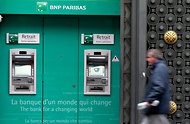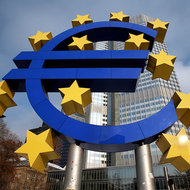The European Commission said the group, which included Citigroup, Goldman Sachs and UBS, shut out Deutsche Boerse and the Chicago Mercantile Exchange from the CDS business between 2006 and 2009.
Credit default swaps (CDS) are over-the-counter contracts that allow an investor to bet on whether a company or country will default on its bonds within a fixed period of time. Lack of transparency on such derivatives is a key target of regulators following the 2007-2009 crisis.
The case is one of several opened by the EU antitrust regulator into the financial services since the crisis. Banks and other companies involved could be fined up to 10 percent of their global turnover if found guilty of infringing EU rules.
The European Commission said on Monday it had sent a statement of objections, or charge sheet, which sets out suspected anti-competitive activities, to the companies.
“It would be unacceptable if banks collectively blocked exchanges to protect their revenues from over-the-counter trading of credit derivatives,” EU Competition Commissioner Joaquin Almunia said.
“Over-the-counter trading is not only more expensive for investors than exchange trading, it is also prone to systemic risks.”
The charges followed a two-year investigation. The other banks charged are Bank of America Merrill Lynch, Barclays, Bear Stearns, BNP Paribas, Morgan Stanley, Credit Suisse, Deutsche Bank, HSBC, JP Morgan and RBS.
UBS, Deutsche Bank, JP Morgan, HSBC and Barclays declined to comment, while the other banks and ISDA were not immediately available for comment. Markit had no immediate comment.
Almunia said some of the banks in the CDS case were also involved in separate investigations into suspected rigging of lending benchmarks Euribor and Libor, but he did not identify them.
“We are trying to follow the Article 9 route. We hope we are ready to adopt a decision towards the end of the year,” EU Competition Commissioner Joaquin Almunia told a news briefing, referring to a procedure where companies can get a 10 percent cut in fines in return for admitting wrongdoing.
(Additional reporting by Steve Slate and Laura Noonan, in London, Martin De Sa’Pinto in Zurich, Christian Plumb and Matthias Blamont in Paris, Kathrin Jones in Frankfurt; Editing by Adrian Croft and David Holmes)

Article source: http://www.nytimes.com/reuters/2013/07/01/business/01reuters-eu-banks-cds.html?partner=rss&emc=rss


